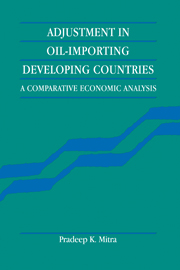
Fiscal and Monetary Policies and Problems in Developing Countries
£41.99
Part of Modern Cambridge Economics Series
- Author: Eprime Eshag, University of Oxford
- Date Published: January 1984
- availability: Available
- format: Paperback
- isbn: 9780521270496
£
41.99
Paperback
Other available formats:
eBook
Looking for an inspection copy?
This title is not currently available on inspection
-
This book is concerned with the use of fiscal and monetary policies to overcome three major obstacles to development commonly faced by less developed countries: inadequate investment; misallocation of investment resources; and internal and external imbalances i.e. inflation and balance of payments deficits. The book is divided into six chapters the first two of which are devoted to the definition of concepts and to an explanation of the Keynesian model of income determination and of Kalecki's model of financing investment, within the framework of which the role of fiscal and monetary measures and of foreign capital is later examined. Chapters 3 and 4 discuss the role of fiscal measures and of foreign capital, respectively, in promoting domestic investment. Chapter 5 examines the use of both fiscal and monetary instruments, including industrial and agricultural development banks, to influence the pattern of investment. The last chapter is devoted to the problems of internal and external imbalances. The author examines policies pursued by a representative sample of developing countries and concludes that most of them fail adequately to exploit the potential of fiscal and monetary instruments and of foreign capital to overcome the three sets of obstacles to development largely bacause of institutonal (socio-political) constraints. The approach to inflation and balance of payments difficulties followed in the book differs significantly from that of monetarists, notably the Chicago school and the IMF, whose basic propositions are reviewed and critically examined in some detail in Chapters 2 and 6. Although the primary focus of the book is on developing economies, this part of it is also relevant to industrial countries.
Customer reviews
Not yet reviewed
Be the first to review
Review was not posted due to profanity
×Product details
- Date Published: January 1984
- format: Paperback
- isbn: 9780521270496
- length: 312 pages
- dimensions: 217 x 138 x 20 mm
- weight: 0.445kg
- contains: 1 b/w illus. 12 tables
- availability: Available
Table of Contents
List of tables and chart
Series preface
Preface
List of abbreviations
Symbols and terminology used
1. The meaning and the strategy of economic development
2. The scope and role of fiscal and monetary policies
3. Financing economic development (I) domestic savings
4. Financing economic development (II) foreign capital
5. The pattern of investment
6. Internal and external equilibrium
Concluding note
Appendix
Index.
Sorry, this resource is locked
Please register or sign in to request access. If you are having problems accessing these resources please email [email protected]
Register Sign in» Proceed
You are now leaving the Cambridge University Press website. Your eBook purchase and download will be completed by our partner www.ebooks.com. Please see the permission section of the www.ebooks.com catalogue page for details of the print & copy limits on our eBooks.
Continue ×Are you sure you want to delete your account?
This cannot be undone.
Thank you for your feedback which will help us improve our service.
If you requested a response, we will make sure to get back to you shortly.
×





